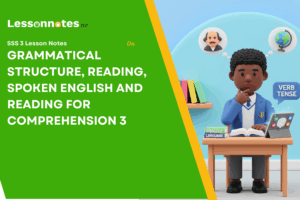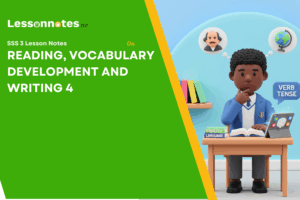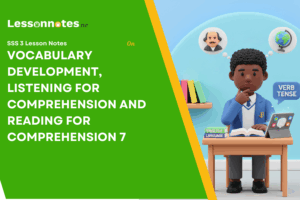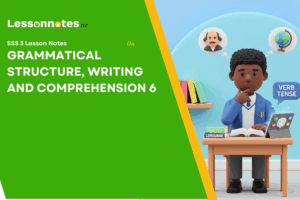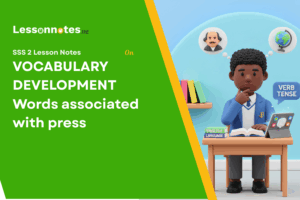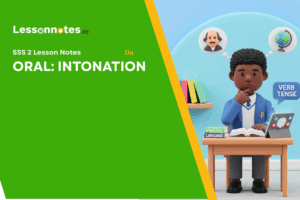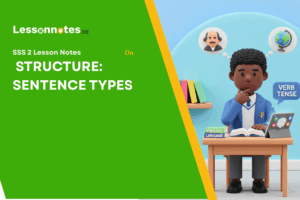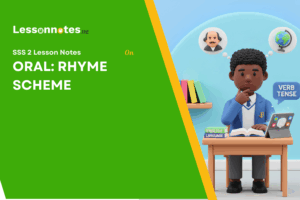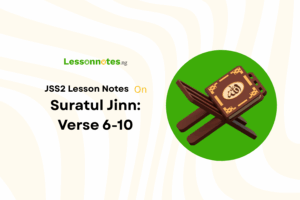Formal & Informal Letters – Format & Features SS3 English Studies Lesson Note
Download Lesson NoteTopic: Formal & Informal Letters – Format & Features
- VOCABULARY DEVELOPMENT
Content
- Definition
- Relevant words
Definition
Government: It is a form of system of government or the act or process of governing
Politics: It is an idea and activities that are concerned with the gaining and using of power in a country, city etc.
| Relevant words | Meaning | |
| 1 | Ballot box | Box into which voters put their ballot paper |
| 2 | Constituency | Voters in a district or area; the district or area itself |
| 3 | Democracy | The government that is run by all the people, directly or through representatives. |
| 4 | Despot | A ruler who does what he likes and oppresses the people directly or through representatives |
| 5 | Electoral College | Group of people who have already been voted in as members of the house, who now may vote in the president |
| 6 | Nomination | Act of naming a candidate for a post or office |
| 7 | Political Party | Group of persons or an association formed for practising politics. |
| 8 | Voting Age | Minimum age at which one is eligible to vote |
| 9 | Election | An occasion when people vote to choose someone for an official position; |
EVALUATION
Choose five vocabularies of government and politics and use them in sentences.
- Use them in sentences
READING ASSIGNMENT
- Countdown in English by Evans 147-148
WEEKEND ASSIGNMENT
Fill in the blanks in the following passage with one of the words in the brackets (democracy, executive, despot, legislature, voting, ballet, electoral, booth, party, vote, constituency, candidate, nominate, election)
In a ___________ system of government and ________ president can very easily become a _________ unless his __________ refused to _______ him for another term. Usually, ___________is by ___________ . Each is usually nominated in his _________by his party.
THEORY
Write a letter to your father who is in another country telling him about the political situation of your country.
- SPOKEN ENGLISH
READING AND APPRECIATING POETRY
APPROACHES TO LITERARY APPRECIATION
THE CONTEXT OF THE TEXT: One of the basic problems confronting readers of a text is the inability to fully appreciate the context referring to the actual meaning and background conveyed by the writer, which can be literal or metaphorical. Here, the point of view of the writer must be taken into cognizance, to have literal and metaphorical knowledge of the work. The content of any work of art centres on its plot and theme or central issues raised in the storyline.
THE STRUCTURE OF THE TEXT: Structure refers to the organisation of text. It is also known as the format of any work of art, that is, the way it is presented by the writer, his use of diction and its effectiveness, as well as the techniques used. All these constitute the structure.
THE POETIC DEVICES EMPLOYED IN THE TEXT: Sometimes, we do not get the correct meaning of a word in a text until we have decided whether it is used literally, that is, according to its basic original meaning, or metaphorically, which means applying one form of meaning to another. Hence, most writers make use of both literal and metaphorical words when writing. Due to this, readers need to have a good knowledge of diction and figurative devices adopted by the writer, as a way of appreciating the text.
THE THEMES OF THE TEXT: The theme means the central message conveyed in any piece of writing. A proper understanding of the theme in a text is very important, and it is a necessary tool for a good and detailed appreciation of the text itself. The theme of a text must not be mistaken for the subject matter, which may only be implied after a proper reading of the text.
EVALUATION
- Discuss the approaches to literary appreciation.
- How important are the rudiments of literary appreciation?
CONCRETE ISSUES IN LITERARY APPRECIATION
The concrete issues in literary appreciation are nothing but the indispensable ingredients meant for an objective and apt understanding of any particular work of art. These are:
- The plot- the storyline, which must be very detailed.
- The theme- the central issues raised in any work of art.
- The style- style of any writing is the technical devices and the way the language is structured. A style is the manner the writing is done which can be classical, down-to-earth, simple or difficult.
- The mood- the feeling of the writer when writing. This must be fully appreciated by the reader to understand the plot and characterization.
- The diction- the effective use of language to carry the theme, plot and mood of the writer.
- Literary devices used- which must be appropriate so as not to confuse the reader. It must allow the reader to understand the work of art.
GENERAL EVALUATION/REVISION QUESTIONS
- List and explain the concrete issues in literary appreciation.
- Explain the significance of the concrete issue in literary appreciation.
WEEKEND ASSIGNMENT
- ‘To drag your father from his farm is as difficult as dragging a child from his mother’s breast’, illustrates (a) metaphor (b) personification (c) simile (d) amplification
- When a poem has no regular rhyme scheme, it is called (a) prose (b) a dramatic verse (c) a lyrical verse (d) a blank verse
- A poem without a regular rhyme is referred to as (a) a blank verse (b) free verse (c) Solomonic verse (d) traditional verse
- ‘How can he compare our church outing with theirs? After all millions of people attended ours while very few people were seen at theirs,’ illustrates what device (a) paradox (b) oxymoron (c) hyperbole (d) comparisoN
- When one work of art attempts to imitate the style of another work mockingly, we describe the newer work as (a) parody (b) innuendo (c) pun (d) farce.
THEORY
- Discuss the importance of literary appreciation.
- How relevant is the historical and socio-political background in appreciating a particular work of art?
WRITING
Formal letters: Formal letters are letters we write to people in their official positions. These people are normally those we do not know personally, who hold official positions in establishments, schools, business houses, etc. Even when we know them personally, the rule demands that we still write them impersonal or official letters.
Formal letters can be in the form of applications for admission or employment, requests for casual leave by staff in offices, official queries and replies to them, letters by students to the heads of their schools, letters to the local government chairman asking for amenities for local communities and other such topics.
Features of a formal letter
- Writer’s address and date
- Receiver’s address
- Salutation
- Heading or topic
- Body of the letter
- Complimentary close
Format of a formal letter
3, Fredrick Close,
Martins Avenue
Lagos.
16th July, 2010
The Commissioner,
Ministry of Education,
Lagos
Dear Sir,
Expansion Programme for Baptist College
Body
Yours faithfully,
(Signature)
John Silas
EVALUATION
Write a letter to the Minister of works in your country complaining about the deplorable condition of the roads in your area and the effects this has on the lives of your people.
- Informal Letters: Informal letters are private or personal letters. They are letters we write to people who are very familiar to us such as our parents, relatives, friends, classmates and other people with whom we have close relationships.
Features of an Informal letter
- Writer’s address and date.
- Salutation
- Introduction
- Body of the letter
- Complimentary close.
Format of an informal letter.
5, Biodun Street,
Alakuko,
Lagos,
16th July, 2010.
Dear Eunice,
Body
Yours sincerely,
Bukky.
EVALUATION
‘You have been staying with your elder brother for some time and a misunderstanding has ensued. Write a letter to your father giving at least three reasons why you feel you can no longer live with your brother.
Adverbs and Adverbials
An adverb is used to describe the action of a verb such as how, where or when it is done.
Examples: He frowned angrily.
The eclipse will occur soon.
The main function of adverbs and adverbial phrases is to modify verbs. They also modify adjectives, other adverbs and prepositional phrases.
Functions of Adverbs and Adverbials.
I. Modifier of verb
Mary solved the problem quickly.
John visited Musa at Kebbi
II. Modifier of adjective.
Peter is very tall
James is far more handsome than Silas.
III. Modifier of another adverb.
Bunmi runs extremely fast.
He works hard enough to pass his exams.
IV. Modifier of a prepositional phrase
The girl slapped Tom right in the face
We are quite on time for the party.
EVALUATION
- Exercise, Question 1, Page 214
- Countdown to English.
READING ASSIGNMENT
- Consonant Clusters
GENERAL EVALUATION
Comprehension
The Dynasty of Ketu
- What two sources of information about the names of kings of Ketu are mentioned in the text?
- What inducement was there for the herald to remember accurately and fluently the names of past Alaketus?
Structure
State the grammatical functions of the underlined expressions.
- He left the letter where it could be easily seen.
- Because he was wrong, he apologised.
- To secure a seat, he arrived at the stadium.
WEEKEND ASSIGNMENT
- Revision and Tests Part 1, Page 60, Effective English.
- Exercise, Question 2, Page 214, Countdown to English.


